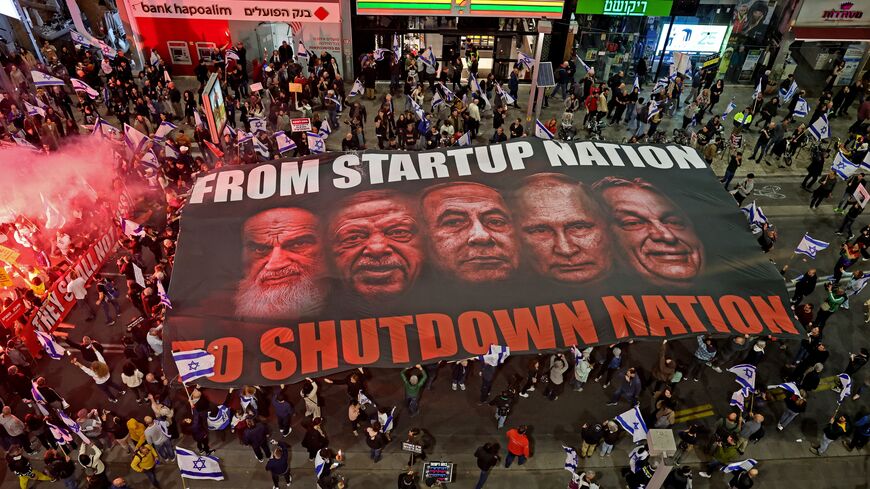More than 6,000 reserve soldiers had signed a petition by Monday evening saying they won’t show up for duty in protest against the government’s judicial overhaul plan. Also on Monday, some 200 reservist military doctors sent a letter to Defense Minister Yoav Gallant saying they won’t show up for duty if the government doesn’t halt the judicial reform. Last week, 37 of the 40 pilots comprising the reserve force of the strategic 69th air squadron announced that they would not show up for their regular weekly training day on March 8. The “Hammer” squadron, as it is known, consists of F-15I fighter jets capable of reaching Iran.
The widening fissures in Israeli society stemming from the government’s judicial overhaul blitz and signs of insubordination among fighters and officers in most combat and elite units of the Israel Defense Forces are already affecting Israel’s deterrence capacity. IDF chief Lt. Gen. Herzl Halevi seems far more concerned by these troubling signs emerging in recent weeks than he is by the immediate threats to Israel’s security on several fronts.
About half of the Israeli air force's pilots are reservists and they form the experienced backbone of its operational capacity. Sitting out the weekly exercises does not count as refusing an order because the activity is considered voluntary and not mandatory. Nonetheless, the pilots’ protest is a sign of the cracks undermining Israeli resilience and preparedness. On Tuesday, the pilots told their commanders they will come to the airbase to discuss the issue.
“We live in a vicious neighborhood, inside an aquarium,” a senior Israeli security source told Al-Monitor on condition of anonymity. “The enemies around us are watching and drawing their conclusions. As of now, their willingness to break the aquarium’s glass walls is rising. They see what is going on inside, and are starting to toy with the idea.”
The legislation designed to weaken the Supreme Court, which many consider a constitutional coup attempt, continues in the Knesset at a breakneck pace despite efforts by President Isaac Herzog to broker a compromise and contain the tears in Israel’s social fabric.
These rifts are having an immediate effect on the IDF. With military service compulsory for all Israeli Jews over the age of 18, concern is being voiced that the mass pro-democracy protests could prompt draft dodging. The concern is heightened by the dozens of petitions, letters and statements issued by reservists in most IDF combat units, many of whom are called up for annual duty to beef up regular units, all with the same message: We will not serve a dictatorship.
This disobedience is unprecedented, even in the darkest days of past social and political divisions such as the near-disastrous military failure of the 1973 Yom Kippur War or the fallout from the 1982 massacre of Muslims by Israeli-backed Christian militias in Lebanon’s Sabra and Shatila refugee camps. Nonetheless, these phenomena are unlikely to damage the IDF’s immediate preparedness for war. Anyone familiar with Israel and its citizenry knows that at times of national threat, everyone mobilizes without hesitation.
Pilots must preserve their professional capabilities with regular exercises. Reservists usually make up half the pilots on combat missions and are often the lead flyers. If they boycott regular exercises, they risk losing their operational preparedness, thereby significantly undermining the IDF’s option of attacking Iran to cripple its nuclear program.
Will the IDF soon resemble the segregated Lebanese army? A senior Israeli military official told Al-Monitor on condition of anonymity this week that the Lebanese air force maintains a sectarian balance at all times. "Any Lebanese helicopter going into the air must have a Muslim pilot and a Maronite one. Combat assignments must adhere to this balance,” the source said. “Our military must not be torn up and divided according to ethnicities, opinions and disagreements. The IDF is built on cohesion, on internal determination, on unity. Undermining this is a blow to Israel's deterrence and resilience."
Halevi tried to address the budding problem, speaking with various units. As the phenomenon spread, so did his efforts. This week, all former air force commanders issued a public letter to Prime Minister Benjamin Netanyahu demanding an immediate halt to the “legal revolution” that he is leading.
"We are concerned about the implications of these processes and the serious and tangible danger to Israel's national security," they wrote. "Out of genuine and deep familiarity with the key and special weight of the corps in national security, [we know] its strength is the special cohesion of its personnel. … We appeal to you to stop and find a solution to the emerging situation as soon as possible."
But Netanyahu is forging ahead under heavy pressure from generals, politicians and the public. The Biden administration has already signaled that an invitation to the White House will not be issued anytime soon. Some indications suggest he is turning into a pariah in the Middle East, too.
The public opposition to his campaign weakening the nation’s top court is also intensifying. Hezbollah Secretary General Hassan Nasrallah is gleefully preparing for Israel’s downfall.
“We are worried that someone might entertain the idea of provoking us in light of the situation,” a senior military official told Al-Monitor on condition of anonymity. “The time may have come to make clear that this is not a game and that it could end very badly for those who take the risk. Israel is still far stronger than all its enemies put together.”







